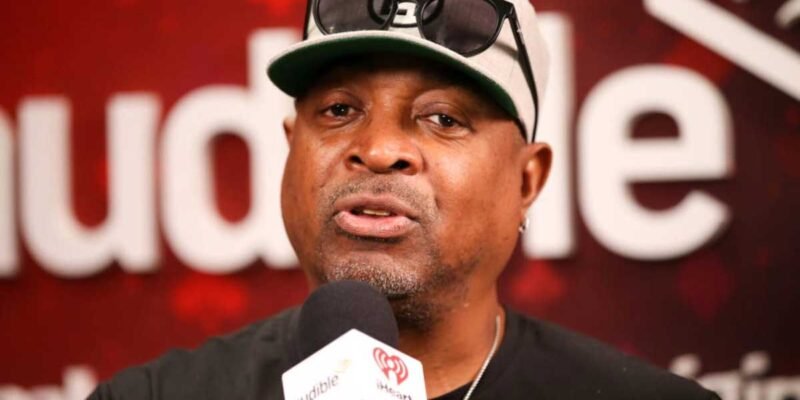The Voice of Resistance Worth Millions
Chuck D has carved out a remarkable place in hip-hop history, accumulating a net worth between $14 and $16 million by 2024. The man behind the microphone, Carlton Douglas Ridenhour, didn’t just build wealth through beats and rhymes. He crafted a financial empire rooted in social activism and unwavering artistic principles.
Most rappers chase the biggest paychecks and flashiest deals. Chuck D took a different route entirely. His money tells a story where staying true to your message actually pays off in the long run.
What makes Chuck D’s wealth particularly interesting is how he balanced making money with making a difference. The Public Enemy leader proved you don’t have to sell out to cash in.
Early Life and the Foundation of Success
Born in Queens on August 1, 1960, Carlton Douglas Ridenhour grew up when hip-hop was just finding its voice. His path to millions started in college classrooms, not recording studios. At Adelphi University, he studied graphic design and earned his Bachelor of Fine Arts in 1984.
College wasn’t just about textbooks for Ridenhour. He dove headfirst into the local hip-hop scene, co-hosting radio shows on Long Island. Those early broadcasting gigs taught him valuable lessons about media and entertainment that would later pad his bank account.
The most important connection he made at Adelphi wasn’t with a professor or textbook. Meeting William Drayton, who became Flavor Flav, set the stage for the financial success that followed. Sometimes the best investments are the relationships you build along the way.
Public Enemy: The Empire That Built Chuck D’s Wealth
Everything changed in 1985 when Public Enemy formed. Rick Rubin heard their track “Public Enemy Number One” and immediately signed them to Def Jam Records. That signature on the dotted line marked the beginning of serious money.
Their 1987 debut “Yo! Bum Rush the Show” got things rolling, but 1988’s “It Takes a Nation of Millions to Hold Us Back” really opened the floodgates. The album went platinum in just twelve months. Those royalty checks started flowing and haven’t stopped since.
Public Enemy kept the hits coming with “Fear of a Black Planet” and “Apocalypse 91… The Enemy Strikes Black.” Each platinum album meant more money in Chuck D’s pocket. Album sales, concert tours, and licensing deals became the building blocks of his fortune.
The numbers speak for themselves: 14 studio albums and over 40 music videos. Public Enemy’s politically charged music didn’t just change minds – it filled bank accounts. Their catalog remains a goldmine that keeps generating revenue decades later.
Beyond Music: Diversifying Income Streams
Smart money doesn’t rely on just one source, and Chuck D figured this out early. His media appearances have become increasingly valuable over the years. Hosting the docuseries “Fight The Power: How Hip Hop Changed The World” brought in both paychecks and credibility.
Television work opened doors to other opportunities. Documentary appearances, interviews, and guest spots all add up. Each project reinforces his reputation as a hip-hop authority, which leads to more lucrative offers.
Voice acting became another unexpected revenue stream. His work in “Grand Theft Auto: San Andreas” (2004) and “NBA Ballers: Chosen One” (2008) showed how his distinctive voice could earn money beyond music. Video game royalties might not make headlines, but they definitely make deposits.
Writing has also contributed to Chuck D’s net worth. His books and essays generate ongoing royalties while establishing him as more than just a rapper. When you’re recognized as a thought leader, speaking fees and consulting opportunities follow.
Financial Milestones and Legal Victories
Chuck D’s biggest financial wins often happened in courtrooms, not concert halls. His 2011 lawsuit against Universal Music Group for $100 million made industry headlines. The case challenged how record labels calculated digital royalties – a fight that affected every artist.
The legal battle focused on a crucial distinction: should online sales count as “licenses” or “unit sales”? This technical difference meant the gap between 18% and 50% royalty rates. Chuck D wasn’t just fighting for himself; he was fighting for every artist getting shortchanged.
Universal settled in 2015 for $11.5 million total. Chuck D’s personal share was around $200,000, but the real victory was forcing the industry to change. Higher royalty rates for digital sales became the new standard, benefiting countless artists.
2019 brought another legal win when Chuck D recovered $1 million in unpaid royalties from Terrordome Music Publishing and Reach Music Publishing. These victories show how protecting your rights can literally pay off.
The biggest recent move came in 2022 when Chuck D sold a major chunk of Public Enemy’s catalog to Reach Music Publishing. Over 300 songs changed hands, including classics like “Welcome To The Terrordome” and “9-1-1 Is A Joke.” The sale price wasn’t disclosed, but catalog deals typically bring seven-figure payouts.
Real Estate and Investment Portfolio
Real estate has been both a blessing and a challenge for Chuck D’s wealth building. His Ventura County, California home was completely destroyed in the 2018 wildfires – a devastating loss that emerged during legal proceedings with Flavor Flav.
Despite that setback, Chuck D maintains a diversified real estate portfolio. Properties in prime locations provide rental income and long-term appreciation. Real estate remains a cornerstone of his investment strategy.
His business ventures extend beyond entertainment into various industries. Rather than chasing risky investments, Chuck D focuses on sustainable wealth building. This conservative approach has served him well over the decades.
The Public Enemy brand itself represents significant value. Licensing deals, merchandise sales, and brand partnerships generate ongoing revenue streams. Owning your intellectual property pays dividends long after the initial creation.
Chuck D Net Worth Compared to Hip-Hop Peers
Chuck D’s $14-16 million puts him in interesting company within hip-hop’s financial hierarchy. He’s nowhere near Jay-Z’s $1.4 billion or Kanye West’s $1.8 billion, but those comparisons miss the point entirely.
The average hip-hop icon sits around $31 million, making Chuck D’s wealth seem modest by comparison. But this gap tells a deeper story about artistic choices and commercial priorities. While others pivoted to fashion lines and liquor brands, Chuck D stayed focused on music and activism.
His financial position makes more sense when compared to other conscious rap pioneers. Artists who prioritized message over maximum profit often show similar wealth patterns. The trade-off between artistic integrity and commercial success is real, but not necessarily permanent.
What’s encouraging is Chuck D’s steady growth trajectory. From an estimated $10 million in 2019 to $16 million in 2024, his wealth continues climbing. This consistent upward trend suggests smart financial management and enduring artistic value.
The Activist’s Approach to Wealth Building
Chuck D’s relationship with money reflects his broader worldview. His criticism of modern rap’s materialism and his comparison of artist-label relationships to slavery show how principles shape his financial decisions.
Being an activist rapper creates unique challenges and opportunities. Political messages might limit mainstream commercial appeal, but they also create devoted fanbases. Authenticity has its own market value.
Social justice work has opened alternative revenue streams through speaking engagements, academic partnerships, and documentary projects. These opportunities might pay less than pure entertainment ventures, but they provide steady income while reinforcing cultural authority.
Chuck D proves that maintaining integrity doesn’t mean sacrificing wealth. His success demonstrates that conscious artistry and commercial viability can coexist, even if they require different strategies and longer timelines.
Current Status and Future Earning Potential
At 64, Chuck D shows no signs of slowing down financially. Public Enemy’s 2020 album release proved the group remains commercially viable after nearly four decades. Age hasn’t diminished their earning power.
The recent catalog sale represents smart financial planning. Rather than holding onto assets indefinitely, Chuck D monetized his life’s work while maintaining creative control over future projects. This strategy provides immediate cash while preserving long-term earning potential.
His role as hip-hop historian and cultural educator positions him perfectly for continued income growth. Media projects, academic collaborations, and speaking engagements all benefit from his expertise and authentic voice. The industry increasingly values its foundational figures.
Chuck D’s wealth appears built to last. Diversified income streams and conservative financial management trump flashy investments and risky ventures. His net worth trajectory suggests continued growth as his cultural significance appreciates over time.
















